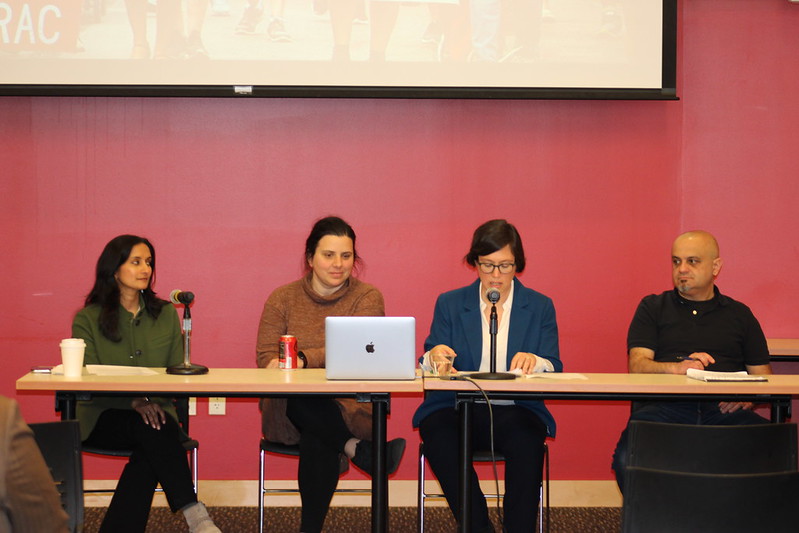The Commonwealth Honors College hosted a panel titled “Immigration and Citizenship in 2023: Reflections and Debates” on Monday, April 3 to discuss immigration research provided by panelists.
The panel, which consisted of three researchers who focus their work on immigration, deportation, detention and other topics regarding the immigration system in the U.S., started with each of the panelists giving a synopsis of their work and current projects.
The panel moderator, Ina Ganguli focuses her research on topics of high scale immigration and works for the Department of Economics at the University of Massachusetts. She opened the discussion and introduced each of the panelists.
The first speaker, journalist and UMass professor Razvan Sibii, focuses his work on language and issues of mass incarceration. Additionally, he is a columnist for the Daily Hampshire Gazette and writes for Romania’s largest daily newspaper.
Sibii described how he combined opinion journalism with explanatory journalism to examine how the immigration system works and understand its flaws. He interviews immigrants themselves, immigrant organizations, policy makers and others affected by the immigration system.
Through his work, Sibii highlights the myths and misconceptions among the endless and misleading information about immigration laws. He explained that many people try to apply logic to the immigration system to explain how it works. However, with the due process system having different parameters in the immigration court, this explanation is misconstrued. He explained that immigrants who claim asylum in court do not have the right to an attorney, unless they can afford one, which most cannot.
This process also heavily affects minors, who are expected to “account for themselves in front of a judge,” Sibii said. He recalled a time when he spoke to immigrants who described seeing children as young as four years old in court in front of a judge. “They are a target,” he said.
Sibii ended by commenting on how the entire immigration system is often confused by the public. He said, “public discourse around incarceration is very simplistic,” commenting on how difficult it is to help the public understand the depth of the issue.
The second panelist who spoke was Lynnette Arnold, an assistant professor of anthropology, who focuses her work on the power of language of migration and how communication participates in care. As a linguistic anthropologist, she focuses on thinking about language and social life. She described how she aims to “develop community engaged pedagogy.”
Much of her research is focused on El Salvador, where she lived during her college years. She studied the separation of transnational families between rural villages and places where families have settled in the U.S. These families are often not “nuclear families,” as described by Arnold, but rather often three to four generations extended.
She lived alongside these families and studied what their lives are like, held interviews with migrants and their families and observed cross-border phone calls. She explained the importance of this transnational mode of communication and the breadth of information she gained from these calls.
Arnold highlighted that, “U.S. foreign policies have contributed to the conditions that urge Salvadorians to leave,” when explaining this separation. “We may think of family separation as a thing of the past,” she said.
She then discussed the implications of Title 42, the closing of the border to Mexico and how the border patrol used this rule to expel over 2 million migrants across the border. She explained that this title expires in May, however it was recently extended to the Canadian border.
Arnold explained that immigrants now use a phone app called CBP One when trying to request asylum at the border. She said the issue with this app is that there are only 700-800 appointment times available in this app, which fill up within five minutes. Additionally, the lack of ability for stable Wi-Fi, faulty facial recognition technology and lack of translations hinder the functionality of the app.
The final speaker, Tania DoCarmo, who is a legal studies fellow and future assistant professor this coming the fall, focuses her work on “intersections of law, society and culture,” as well as how “social problems are socially constructed, women migrants and disadvantaged populations.”
DoCarmo, who has a PhD in sociology, examines how law shapes social activities, practices and day to day lives. She visited detention centers in California before the COVID-19 pandemic and interviewed over 200 interviews with men and women regarding these issues. She explained that some flew from other places to seek asylum at LAX airport, only to discover that they had the wrong visa and had to be detained to wait for a flight back to their home country.
“The phenomenon of immigration detention is not new and is growing,” DoCarmo said. “It’s inherently violent and punitive.” She finished by explaining how this whole process is a punishment: “We can’t push people through the system and then deport them,” she said.
The discussion finished with questions from Ganguli as well as the audience. Ganguli concluded with the importance of learning to listen to these issues, as “some of this can feel very far away.”
Abby Joyce can be reached at [email protected].




















